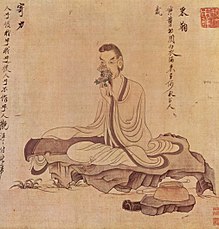
Back Таа Юаньмін Byelorussian Tao Yuanming Breton Tao Yuanming Catalan تاوۆ یوانمینگ CKB Tchao Jüan-ming Czech Tao Yuanming German Tao Yuanming Esperanto Tao Yuanming Spanish تائو ژیان Persian Tao Yuanming French
Tao Yuanming | |
|---|---|
 Portrait of Tao Yuanming by Chen Hongshou | |
| Born | c. 365 Chaisang (modern Jiujiang) |
| Died | 427 |
| Occupation | Poet, politician |
| Notable works | Account of the Peach Blossom Spring |
| Tao Yuanming | |||||||||||||||||||||||||
|---|---|---|---|---|---|---|---|---|---|---|---|---|---|---|---|---|---|---|---|---|---|---|---|---|---|
 "Tao Yuanming" in Traditional (top) and Simplified (bottom) Chinese characters | |||||||||||||||||||||||||
| Traditional Chinese | 陶淵明 | ||||||||||||||||||||||||
| Simplified Chinese | 陶渊明 | ||||||||||||||||||||||||
| |||||||||||||||||||||||||
| Alternative Chinese name | |||||||||||||||||||||||||
| Chinese | 陶潛 | ||||||||||||||||||||||||
| Literal meaning | (original name) | ||||||||||||||||||||||||
| |||||||||||||||||||||||||
Tao Yuanming (simplified Chinese: 陶渊明; traditional Chinese: 陶淵明; pinyin: Táo Yuānmíng; 365–427), also known as Tao Qian (pinyin: Táo Qián; also T'ao Ch'ien in Wade–Giles), was a Chinese poet and politician who was one of the best-known poets during the Six Dynasties period. He was born during the Eastern Jin dynasty (317–420) and died during the Liu Song (420–479) dynasty (Jin-Song transition). Tao Yuanming spent much of his life in reclusion, living in the countryside, farming, reading, drinking wine, receiving the occasional guest, and writing poems in which he often reflected on the pleasures and difficulties of life, as well as his decision to withdraw from civil service. Tao's simple and direct style was somewhat at odds with the norms for literary writing in his time.[1] In the Tang dynasty (618–907), he was well known as a recluse. During the Northern Song dynasty (960–1127), influential literati figures such as Su Shi (1037–1101) declared him a paragon of authenticity and spontaneity in poetry, predicting that Tao Yuanming would achieve lasting literary fame.[2] However, Tao Yuanming's inclusion in the 6th century literary anthology Wen Xuan argues for at least a beginning of fame in his own era, at least in his own birth area. Tao Yuanming would later be regarded as the foremost representative of what we now know as Fields and Gardens poetry. Tao Yuanming found inspiration in the beauty and serenity of the natural world close at hand. Tao Yuanming is depicted in the Wu Shuang Pu (無雙譜, Table of Peerless Heroes) by Jin Guliang.
- ^ Tian, Xiaofei (2013). "From the Eastern Jin through the early Tang (317–649)" in The Cambridge History of Chinese Literature, Volume 1. Cambridge, U.K.: Cambridge University Press. pp. 221–2. ISBN 978-1107643246.
- ^ Tian, Xiaofei. "From the Eastern Jin through the early Tang (317–649)". pp. 221–2.